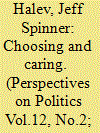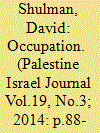| Srl | Item |
| 1 |
ID:
132980


|
|
|
|
|
| Publication |
2014.
|
| Summary/Abstract |
Choice and markets have always been central to liberalism. Liberals wants people to choose their occupation, their partners, and what goods to buy. All liberals agree that making choices is central to the autonomous life. But the scope and conditions of choice quickly becomes controversial among liberals, as the four books under review reveal. Joan Tronto and Michael Sandel worry about the spread of market thinking to all other spheres of life, John Tomasi argues that too many contemporary liberals underestimate the importance of economic liberty, while Sarah Conly argues that we have a large swath of empirical evidence to question the idea that individuals can readily make correct rational decisions. Conly is not against individual autonomy, but she urges us to recognize autonomy's limitations. While political theorists are often reluctant to think about policy, doing so is certainly a virtue when the topic is markets and choice; one of the strengths of Conly's and Tronto's books is their willingness to apply their arguments to specific policy realms.
|
|
|
|
|
|
|
|
|
|
|
|
|
|
|
|
| 2 |
ID:
129849


|
|
|
|
|
| Publication |
2014.
|
| Summary/Abstract |
The phrase "Obstacles to successful negotiation" has a somewhat distant ring to it. I was a little taken aback when I first read it. It's an abstraction, and far too hopeful at that. Obstacles could in theory, be removed. Maybe someday they will be. But, for now, anyone who knows the reality of what is happening on the ground in the south Herbon Hills isn't likely to think in terms of obstacles.
|
|
|
|
|
|
|
|
|
|
|
|
|
|
|
|
| 3 |
ID:
074636


|
|
|
|
|
| Publication |
2006.
|
| Summary/Abstract |
If analysts want to understand the forces that give rise to the sovereign units that make up the 'us' and 'them' comprising the affinities and enmities of enduring inter-state inequality and systemically violent conflict, then we must move beyond the Weberian understanding of the state as an institution that has a monopoly of the legitimate use of violence and towards a deeper understanding of the rules that hold together the state as a membership organisation. This means several things but, for the purposes of this article, imagining the cessation of war and a truly global politics (committed to enabling conditions for the creative recreation of the planet and its inhabitants, regardless of where or to whom they were born) means understanding how all states create the form of the 'other' liable to yield death as an active or passive consequence of their kinship rules.
|
|
|
|
|
|
|
|
|
|
|
|
|
|
|
|
| 4 |
ID:
132159


|
|
|
|
|
| Publication |
2014.
|
| Summary/Abstract |
The state is the most precious of human possessions," the economist Alfred Marshall remarked in 1919, toward the end of his life, "and no care can be too great to be spent on enabling it to do its work in the best way." For Marshall, one of the founders of modern economics and a mentor to John Maynard Keynes, this truth was self-evident. Marshall believed that the best way to solve the central paradox of capitalism -- the existence of poverty among plenty -- was to improve the quality of the state. And the best way to improve the quality of the state was to produce the best ideas. That is why Marshall read political theorists as well as economists, John Locke as well as Adam Smith, confident that studying politics might lead not only to a fuller understanding of the state but also to practical steps to improve governance.
|
|
|
|
|
|
|
|
|
|
|
|
|
|
|
|